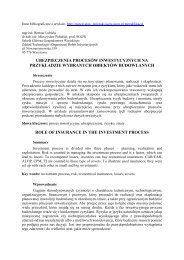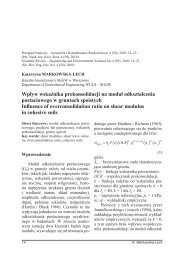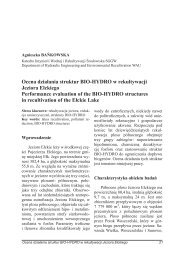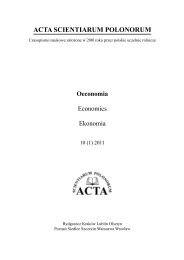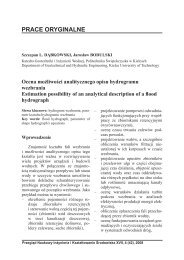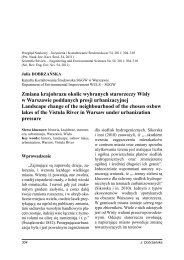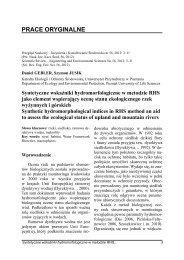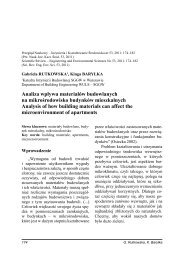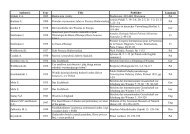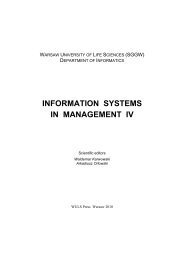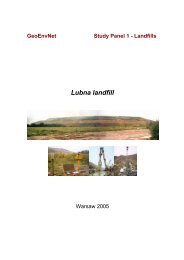Acta Scientiarum Oeconomia 9 (1)
Acta Scientiarum Oeconomia 9 (1)
Acta Scientiarum Oeconomia 9 (1)
Create successful ePaper yourself
Turn your PDF publications into a flip-book with our unique Google optimized e-Paper software.
<strong>Oeconomia</strong> 9 (1) 2010, 49–59<br />
Mahmud A. Geheder, Mohamed S. Moussa, Emhemed R. Shnibesh, Abdulhamid A. Yousef<br />
THE ROLE OF TRADE WITH THE EU IN LIBYAN ECONOMY DEVELOPMENT<br />
Abstract. The paper is based on an economic analysis of the Libya’s foreign trade during the<br />
period 1970–2006, with special reference to the trade process between Libya and the EU. In<br />
addition, the paper investigates the process of adjustment of Libyan imports from the EU, in the<br />
level of domestic economic activities (real Inco me), the consumer price index (CPI), and the<br />
exchange rates of the Libyan dinar. The aim is to provide estimates of the aggregate demand of<br />
Libya’s imports from the EU over the period, applying standard econometrics techniques<br />
complemented by appropriate diagnostic tests based on recent and by now widely used dynamic<br />
modeling and cointegration techniques. As well as the paper tends to estimate a long run of the<br />
independent variables elasticity stated above for Libya’s imports from the EU. The findings<br />
suggest more economic cooperation through bilateral relations, improving the investment<br />
environment in the Libyan market and supporting further economic cooperation through the<br />
Euro-Mediterranean Process and suggest the need for trade agreement with the EU.<br />
Key words: trade, economic development, econometrics, EU, Libya<br />
ZNACZENIE HANDLU Z UE W ROZWOJU LIBIJSKIEJ GOSPODARKI<br />
Streszczenie. Opracowanie zawiera analizę libijskiego handlu zagranicznego w latach 1970–<br />
2006, ze szczególnym uwzględnieniem handlu z krajami Unii Europejskiej. W artykule<br />
przedstawiono proces zmian libijskiego importu z krajów UE z uwzględnieniem poziomu<br />
dochodów realnych, indeksu wzrostu cen towarów i usług konsumpcyjnych oraz kursu wymiany<br />
libijskiego dinara. Celem opracowania jest ocena zagregowanego libijskiego popytu na import z<br />
UE w przyjętym okresie przy wykorzystaniu standardowych technik ekonometrycznych<br />
uzupełnionych przez odpowiednie testy diagnostyczne oparte na szeroko obecnie<br />
wykorzystywanych technikach dynamicznego modelowania i kointegracji. Wyniki analiz sugerują<br />
większą współpracę ekonomiczną poprzez kontakty dwustronne, poprawę środowiska<br />
inwestycyjnego w Libii, wspieranie przyszłej współpracy w ramach Procesu Morza<br />
Śródziemnego oraz wskazują potrzebę porozumień handlowych z UE.<br />
Słowa kluczowe: handel, rozwój ekonomiczny, ekonometria, UE, Libia




